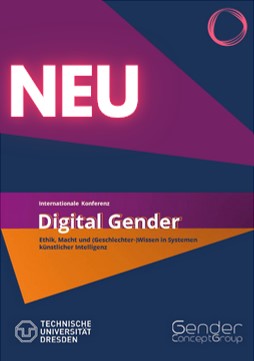Refusing Platform Promises
A Gendered Rewriting of Digital Imaginaries
DOI:
https://doi.org/10.17169/ogj.2023.214Keywords:
Digital Cultures, Digital Platforms, Social Media, Violence against WomenAbstract
Platforms have recently come under scrutiny, both in policy and in scholarship. Yet, there is little attention paid to the notion and materiality of gendered practices. Although gender is present on these platforms, it is not necessarily endemic or critical to the analysis of these platformed practices.
Platform Promises is a way by which we look at platformisation of gender, focusing on how gender politics are coded into the logic and infrastructure of these platforms. I propose that we stop thinking about platforms as technological engineering artefacts upon which conditions of gender are operationalised. This framing makes us believe that gendered and sexual violence online are a state of exception which can be fixed through better regulation and governance.
I propose that we use gender as both a discursive and an analytic category by which to rewrite the discourse on platforms, to see the platform promises that are taken for granted and are not questioned in the dominant narratives.
References
Abidin, Crystal (2018): Internet Celebrity. Understanding Fame Online. Bingley: Emerald. doi: 10.1108/9781787560765
Association for Progressive Communications (2017): Online Gender-Based Violence. A Submission from the Association for Progressive Communication to the United Nations Special Rapporteur on Violence Against Women, its Causes and Consequences. https://www.apc.org/en/pubs/online-gender-based-violence-submission-association-progressive-communications-united-nations (07.10.2023).
Association for Progressive Communications (2016): Feminist Principles of the Internet. Version 2.0. https://www.apc.org/en/pubs/feminist-principles-internet-version-20 (07.10.2023).
Arkenbout, Chloë/Wilson, Jack/de Zeeuw, Daniel (Ed.) (2021): Critical Meme Reader. Global Mutations of the Viral Image. Amsterdam: Institute of Network Cultures. doi: 10.25969/mediarep/19281
Arun, Chinmayi/Prasad, Smitha Krishna (2018): Towards a Data Protection Framework. Social Science Research Network. doi: 10.2139/ssrn.3151222
Auslander, Philip (2012): Digital Liveness. A Historico-Philosophical Perspective. In: PAJ. A Journal of Performance and Art 34 (3), 3–11. doi: 10.1162/PAJJ_a_00106
Barabási, Albert-László (2002): Linked. The New Science of Networks. Cambridge: Perseus.
Benkler, Yochai (2006): The Wealth of Networks. How Social Production Transforms Markets and Freedom. New Haven: Yale University Press.
Chun, Wendy Hui Kyong (2021): Discriminating Data. Correlation, Neighbourhoods and the New Politics of Recognition. Cambridge: MIT Press. https://doi.org/10.7551/mitpress/14050.001.0001
Chun, Wendy Hui Kyong/Friedland, Sarah (2015): Habits of Leaking. Of Sluts and Networks Cards. Differences 26 (2), 1–28. doi: 10.1215/10407391-3145937
Datta, Ayona (2020): Self(ie)-Governance. Technologies of Intimate Surveillance in India under COVID-19. In: Dialogues in Human Geography 10 (2), 234–237. doi: 10.1177/204382062092979
Dibbell, Julian (1993): A Rape in Cyberspace: How an Evil Clown, a Haitian Trickster Spirit, Two Wizards, and a Cast of Dozens Turned a Database into a Society. http://www.juliandibbell.com/texts/bungle_vv.html (07.10.2023).
Dutta, Prabhash (2022): Who are Trads, the dangerous group Bulli Bai founder belongs to? https://www.indiatoday.in/india/story/trads-dangerous-group-bulli-bai-founder-sulli-deals-1898457-2022-01-11 (07.10.2023).
Galloway, Alexander R. (2006): Protocol. How Control Exists after Decentralization. Cambridge: MIT Press.
Ganesh, Maya Indira (2017): Entanglement. Machine Learning and Human Ethics in Driver-less Car Crashes. In: APRJA. A Peer-Reviewed Journal about Minor Tech 6 (1), 7–87. doi: 10.7146/aprja.v6i1.116013
Gibson, William (1984): Neuromancer. New York: Penguin Putnam.
Gillespie, Tarleton (2017): The Platform Metaphor, Revisited. In: Culture Digitally. https://www.hiig.de/en/the-platform-metaphor-revisited/ (07.10.2023).
Haugen, Frances (2021): Statement of Frances Haugen. Whistleblower Aid. Unites States Senate Committee on Commerce, Science and Transportation. https://www.commerce.senate.gov/services/files/FC8A558E-824E-4914-BEDB-3A7B1190BD49 (07.10.2023).
Helmond, Anne (2015): The Platformisation of the Web. Making Web Data Platform Ready. In: Social Media + Society 1 (2). doi: 10.1177/2056305115603080
Iyer, Neema/Nyamwire, Bonnita/Nabulega, Sandra (2020): Alternate Realities, Alternate Internets. African Feminist Research for A Feminist Internet. Pollicy. https://ogbv.pollicy.org/report.pdf (07.10.2023).
Jasanoff, Sheila/Kim, Sang-Hyun (Ed.) (2015): Dreamscapes of Modernity. Sociotechnical Imaginaries and the Fabrication of Power. Chicago: University of Chicago Press. doi: 10.7208/chicago/9780226276663.001.0001
Juhasz, Alexandra/Shah, Nishant (2021): Introduction. In: Juhasz, Alexandra/Langlois, Ganaele/Shah, Nishant (Ed.): Really Fake. In Search of Media. Minneapolis: University of Minnesota Press, Lüneburg: Meson Press, ix–xii.
Kayyali, Dia (2015): New Report Shows European Data Protection Authorities are Taking Facebook’s Questionable Terms of Service Seriously’. https://www.eff.org/es/deeplinks/2015/02/new-report-shows-european-data-protection-authorities-are-taking-facebooks (07.10.2023).
Kim, Kelly (2020): Recent Debates on Data Utilisation and Protection. 3 Data Laws and Lee Luda. In: Shah, Nishant (Ed.): Platform Futures. Data Opportunities and Challenges. Hong Kong: Digital Asia Hub, 13–35. https://www.digitalasiahub.org/small-books-for-big-platforms.
Kittler, Friedrich A. (2014): The Truth of the Technological World. Essays on the Genealogy of Presence, 219–229. Translated by Erik Butler. Redwood City: Stanford University Press. doi: 10.1515/9780804792622-016
Losh, Elizabeth (2016): Hiding Inside the Magic Circle. Gamergate and the End of Safe Space. https://www.boundary2.org/2016/08/elizabeth-losh-hiding-inside-the-magic-circle-gamergate-and-the-end-of-safe-space (07.10.2023).
Malhotra, Namita (2015): Good Questions on Technology-Related Violence. https://www.apc.org/en/pubs/good-questions-technology-related-violence.
Manovich, Lev (2001): The Language of New Media. Cambridge: MIT Press.
O’Neil, Cathy (2016): Weapons of Math Destruction. How Big Data Increases Inequality and Threatens Democracy. New York: Crown.
Pandey, Geeta (2021): Sulli Deals. The Indian Muslim women ‘up for sale’ on an app. https://www.bbc.com/news/world-asia-india-57764271 (07.10.2023).
Perez, Sarah (2022): Consumers Swap Period Tracking Apps in Search of Increased Privacy Following Roe v. Wade Ruling’. https://techcrunch.com/2022/06/27/consumers-swap-period-tracking-apps-in-search-of-increased-privacy-following-roe-v-wade-ruling (07.10.2023).
Philip, Kavita/Irani, Lilly/Dourish, Paul (2010): Postcolonial Computing. A Tactical Survey. In: Science, Technology, & Human Values 37 (1), 3–29. doi: 10.1177/0162243910389594
Poell, Thomas/Nieborg, David/van Dijck, José (2019): Platformisation. In: Internet Policy Review 8 (4), 1–13. doi: 10.14763/2019.4.1425
Prasad, Smitha Krishna (2021): Covid-19 and Public Health Platforms in India. In: Shah, Nishant (Ed.): Platform Futures. Data Opportunities and Challenges. Hong Kong: Digital Asia Hub, 53–73. https://www.digitalasiahub.org/small-books-for-big-platforms.
Ramesh, Mythreyee (2021): ‘Sulli Deals’. How Photos of Muslim Women were Misused on a GitHub App. https://www.thequint.com/neon/gender/sulli-deals-photos-of-muslim-women-misused-github (07.10.2023).
Raval, Noopur/Lalvani, Simiran (2022): The Moral Economy of Platform Work. In: Asiascape. Digital Asia 8 (1–2), 144–174. doi: 10.1163/22142312-bja10031
Salim, Mariya (2022): ‘Bulli Bai’, ‘Sulli Deals’: On being put up for ‘Auction’ as an Indian Muslim Woman. https://thewire.in/communalism/indian-muslim-woman-auction-bulli-bai (07.10.2023).
Scholz, Trebor (2016): Platform Cooperativism. Challenging the Corporate Sharing Economy. New York: Rosa Luxemburg Stiftung.
Shah, Nishant (2016): Exposing Pornography: The body between the old and the new. In: Chun, Wendy Hui Kyong/Fisher, Anna Watkins/Keenan, Thomas (Ed.): New Media, Old Media: A History and Theory Reader. New York: Routledge, 539–551.
Sinha, Jignasa/Siddigue, Iram (2022): Delhi Police Arrest BCA Graduate from Indore for Hate App Case Filed in July. https://indianexpress.com/article/cities/delhi/delhi-police-arrests-indore-man-sulli-deals-app-7714046 (07.10.2023).
Tsing, Anna Lowenhaupt (2012): On Nonscalability. The Living World is Not Amenable to Scales. In: Common Knowledge 18 (3), 505–524. doi: 10.1215/0961754X-1630424
Wang, Tricia (2013): Why Big Data Needs Thick Data. http://ethnographymatters.net/blog/2013/05/13/big-data-needs-thick-data (07.10.2023).
Zakaria, Rafia (2021): Against White Feminism: Notes on Disruption. New York: Norton & Company.

Downloads
Published
How to Cite
Issue
Section
Categories
License
Copyright (c) 2023 Nishant Shah

This work is licensed under a Creative Commons Attribution 4.0 International License.
All contributions in Open Gender Journal are published under the Creative Commons Attribution 4.0 International license. You may freely make use of the corresponding texts in accordance to the conditions of the license (License contract, generally understandable version). There is no exclusive transfer of usage rights ("copyright transfer"). Open Gender Journal does not charge authors any costs for publication (so-called Article Processing Charges, APC) or submission (so-called Submission Charges). Authors are encouraged to share their contributions in other places, such as repositories.












